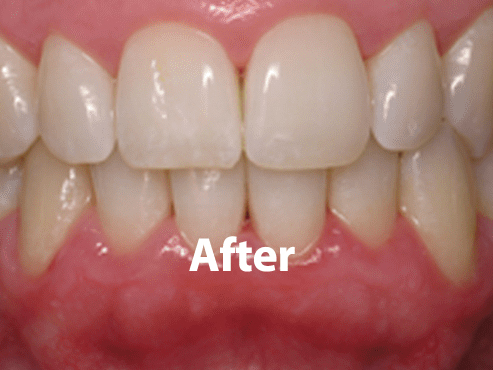Periodontal disease and treatment
The tissues that support the teeth – the bone and the gums – are called the periodontium. Periodontal health is fundamental to having healthy teeth and and a healthy mouth. Periodontal disease is an infection of the tissues that support your teeth.
Between the tooth and the gum is a crevice, called the sulcus. In health, this crevice is between 0.7 and 2.5mm. depending on the site around each tooth. Periodontal disease attacks inside the sulcus, breaking down the attachment between the tooth and the gum. As the attachment breaks down, the depth of the sulcus increases, forming a pocket.
There are various stages of periodontal diseases, classified according to the severity of the disease and the attachment loss. The earliest stage is gingivitis. Once pocket formation begins the disease is classified as periodontitis.
Gingivitis is a milder and reversible form of periodontal disease that only affects the gums. Left unchecked, gingivitis may progress to the more serious, and destructive periodontitis.



See before and after
Some risk factors for developing periodontal disease:
- Smoking
- Diseases such as diabetes
- Medications – these include but are not limited to steroids, some anti-epilepsy drugs, cancer therapy drugs, some calcium channel blockers and oral contraceptives
- Crooked teeth
- Fillings or crowns that don’t fit well or that have become defective
- Hormonal changes as in pregnancy or with the use of oral contraceptives
Some warning signs of periodontal disease are:
- Bleeding gums
- Red, swollen, tender gums
- Gums that are not tightly attached to the teeth
- Bad breath
- Bad taste
- Loose teeth
- Gaps forming between teeth
- Changes in the way the teeth fit together when you bite
It is possible to have periodontal disease and have no warning signs.
That is one reason why regular dental checkups and periodontal examinations are very important. Treatment methods depend upon the type of disease and how far the condition has progressed.
Good oral hygiene at home is essential to help keep periodontal disease from becoming more serious or recurring. Brushing, flossing and a healthy diet and not smoking are the best ways to try to avoid periodontal disease.
Treatment of periodontal disease depends on the severity. It can range from simple scaling and polishing the teeth, to root planing and in more severe cases to surgery.
Need more information?
For more information about our dental practice in general, or if you have a specific question about your dental care needs, please call us on (02) 8883 4560, email our dental practice at [email protected] or send us a message below and we will do our best to help you.
How can our dental practice help you with your dental care needs?
Whether your dental care needs are a regular dental check-up or you require more comprehensive dental care, the team at our dental practice will do our best to provide you with the best possible advice and care.
Want more information about our dental practice?
For more information about our dental practice in general, or if you have a specific question about your dental care needs, please call us on (02) 8883 4560, email our dental practice at [email protected] or send us a message below and we will do our best to help you.



